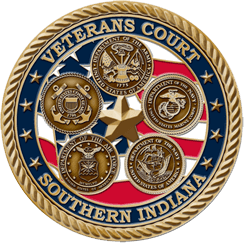VETERANS COURT PARTICIPATION
To be considered, you must:
- Have served in the United States Armed Forces
- Have a criminal charge or violation of community supervision
- Complete an assessment with the Veterans Court Representative
How can I participate in Veterans Court?
At some point following your arrest, you were provided several choices. Participating in the Veterans Court Program or remaining in criminal court for prosecution and sentencing on your pending charges.
If I want to apply, what is next?
If you want to apply to the program, you should let your attorney know. You can contact Nicole (program coordinator) or Kennedy (reentry coordinator) to schedule an assessment by calling 812-948-5410 or click on the intake button provided below.
Veterans Court of Southern Indiana is a voluntary program. If you're accepted into Veterans Court, successful completion and graduation from Veterans Court may result in reducing or dismissal of the pending charges or the imposition of a more favorable sentence, depending on the terms of your individual participation agreement. The amount of time you spend in the Veterans Court program will be determined by your individual progress, but it will be no less than 11 months.
Always keep in mind that removal from Veterans Court may result in a return to criminal court or sentencing on the charge(s) to which you have been convicted.
Veterans Court Intake Form



